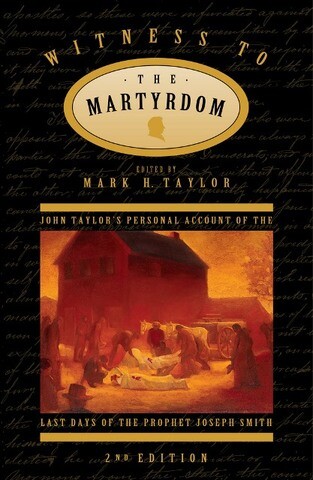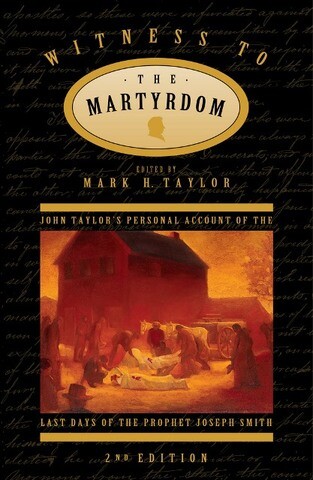In honor of the 175th anniversary of the martyrdom of the Prophet Joseph Smith and his brother Hyrum, LDS Living is sharing a series of articles about early Church history. The following is an excerpt from the second edition of Witness to the Martyrdom: John Taylor’s Personal Account of the Last Days of the Prophet Joseph Smith. John Taylor’s narrative is the only eyewitness account of these events in Church history. After the martyrdom of Joseph and Hyrum Smith, John Taylor became “a living martyr” and wrote a personal account of the events. He served as the third president of the Church of Jesus Christ of Latter-day Saints.
It certainly was a terrible scene: streams of fire as thick as my arm passed by me as these men fired, and, unarmed as we were, it looked like certain death. I remember feeling as though my time had come, but I do not know when, in any critical position, I was more calm, unruffled, and energetic, and acted with more promptness and decision. It certainly was far from pleasant to be so near the muzzles of those firearms as they belched forth their liquid flame and deadly balls. While I was engaged in parrying the guns, Brother Joseph said, ‘That’s right, Brother Taylor, parry them off as well as you can.’ These were the last words I ever heard him speak on earth.
Every moment the crowd at the door became more dense, as they were unquestionably pressed on by those in the rear ascending the stairs, until the whole entrance at the door was literally crowded with muskets and rifles, which, with the swearing, shouting, and demoniacal expressions of those outside the door and on the stairs, and the firing of guns, mingled with their horrid oaths and execrations, made it look like pandemonium let loose, and was, indeed, a fit representation of the horrid deed in which they were engaged.
After parrying the guns for some time, which now protruded thicker and farther into the room, and seeing no hope of escape or protection there, as we were now unarmed, it occurred to me that we might have some friends outside, and that there might be some chance of escape in that direction, but here there seemed to be none.
As I expected them every moment to rush into the room—nothing but extreme cowardice having kept them out—as the tumult and pressure increased, without any other hope, I made a spring for the window which was right in front of the jail door, where the mob was standing, and also exposed to the fire of the Carthage Greys, who were stationed some ten or twelve rods off. The weather was hot, we all of us had our coats off, and the window was raised to admit air. As I reached the window, and was on the point of leaping out, I was struck by a ball from the door about midway of my thigh, which struck the bone, and flattened out almost to the size of a quarter of a dollar, and then passed on through the fleshy part to within about half an inch of the outside. I think some prominent nerve must have been severed or injured for, as soon as the ball struck me, I fell like a bird when shot, or an ox when struck by a butcher, and lost entirely and instantaneously all power of action or locomotion. I fell upon the windowsill and cried out, ‘I am shot!’ Not possessing any power to move, I felt myself falling outside of the window, but immediately I fell inside, from some, at that time, unknown cause. When I struck the floor my animation seemed restored, as I have seen it sometimes in squirrels and birds after being shot. As soon as I felt the power of motion I crawled under the bed, which was in a corner of the room, not far from the window where I received my wound. While on the way and under the bed I was wounded in three other places; one ball entered a little below the left knee, and never was extracted; another entered the forepart of my left arm, a little above the wrist, and, passing down by the joint, lodged in the fleshy part of my hand, about midway, a little above the upper joint of my little finger; another struck me on the fleshy part of my left hip, and tore away the flesh as large as my hand, dashing the mangled fragments of flesh and blood against the wall.
My wounds were painful, and the sensation produced was as though a ball had passed through and down the whole length of my leg. I very well remember my reflections at the time. I had a very painful idea of becoming lame and decrepid, and being an object of pity, and I felt as though I would rather die than be placed in such circumstances.
It would seem that immediately after my attempt to leap out of the window, Joseph also did the same thing, of which circumstance I have no knowledge, only from information. The first thing that I noticed was a cry that he had leaped out of the window. A cessation of firing followed, the mob rushed downstairs, and Dr. Richards went to the window. Immediately afterward I saw the doctor going towards the jail door, and as there was an iron door at the head of the stairs, adjoining our door which led into the cells for criminals, it struck me that the doctor was going there, and I said to him, ‘Stop, Doctor, and take me along.’ He proceeded to the door and opened it, and then returned and dragged me along to a small cell prepared for criminals.
Brother Richards was very much troubled, and exclaimed, ‘Oh! Brother Taylor, is it possible that they have killed both Brother Hyrum and Joseph? it cannot surely be, and yet I saw them shoot them;’ and elevating his hands two or three times, he exclaimed, ‘Oh Lord, my God, spare Thy servants!’ He then said, ‘Brother Taylor, this is a terrible event;’ and he dragged me farther into the cell, saying, ‘I am sorry I can not do better for you;’ and, taking an old, filthy mattress, he covered me with it, and said, ‘That may hide you, and you may yet live to tell the tale, but I expect they will kill me in a few moments.’ While lying in this position I suffered the most excruciating pain.
Soon afterwards Dr. Richards came to me, informed me that the mob had precipitately fled, and at the same time confirmed my worst fears that Joseph was assuredly dead. I felt a dull, lonely, sickening sensation at the news. When I reflected that our noble chieftain, the Prophet of the living God, had fallen, and that I had seen his brother in the cold embrace of death, it seemed as though there was a void or vacuum in the great field of human existence to me, and a dark gloomy chasm in the kingdom, and that we were left alone. Oh, how lonely was the feeling! How cold, barren and desolate! In the midst of difficulties he was always the first in motion; in critical positions his counsel was always sought. As our Prophet he approached our God, and obtained for us his will; but now our Prophet, our counselor, our general, our leader, was gone, and amid the fiery ordeal that we then had to pass through, we were left alone without his aid, and as our future guide for things spiritual or temporal, and for all things pertaining to this world, or the next, he had spoken for the last time on earth.
These reflections and a thousand others flashed upon my mind. I thought, why must the good perish, and the virtuous be destroyed? Why must God’s nobility, the salt of the earth, the most exalted of the human family, and the most perfect types of all excellence, fall victims to the cruel, fiendish hate of incarnate devils?
The poignancy of my grief, I presume, however, was somewhat allayed by the extreme suffering that I endured from my wounds.
. . . a ball had struck me at the time I felt myself falling out of the window, and that it was this force that threw me inside. I had often remarked to Mrs. Taylor the singular fact of finding myself inside the room, when I felt a moment before, after being shot, that I was falling out, and I never could account for it until then; but here the thing was fully elucidated, and was rendered plain to my mind. I was indeed falling out, when some villain aimed at my heart. The ball struck my watch, and forced me back; if I had fallen out I should assuredly have been killed, if not by the fall, by those around, and this ball, intended to dispatch me, was turned by an overruling Providence into a messenger of mercy, and saved my life. I shall never forget the feelings of gratitude that I then experienced towards my heavenly Father; the whole scene was vividly portrayed before me, and my heart melted before the Lord. I felt that the Lord had preserved me by a special act of mercy; that my time had not yet come, and that I had still a work to perform upon the earth.
(Signed) John Taylor
Lead image from Shutterstock
On June 27, 1844, John Taylor, who was in Carthage Jail along with Joseph and Hyrum Smith and Willard Richards, courageously sought to defend his beloved leader against a murderous mob. In the barrage of bullets that killed Joseph and Hyrum, John Taylor was severely wounded. He recovered his health, however, and some time later he put into writing his recollections of the Prophet's final days on earth. John Taylor's detailed first-person account of the Martyrdom is a witness to the goodness and deep faith of the leading Brethren of the restored Church. Witness to the Martyrdom includes John Taylor's written account in its entirety. In addition, it helps readers place his testimony into perspective with
- A summary of early events in John Taylor's life.
- A discussion of the events immediately following the Martyrdom.
- A brief outline of John Taylor's life, including his service as third president of the Church.
As B.H. Roberts stated, Elder Taylor's record of these events is "of highest historical value" and "deserves to live forever." Endowed with the authenticity that only a first-person account can give, this book is an essential addition to the Latter-day Saint bookshelf. Available at Deseret Book stores and deseretbook.com.



